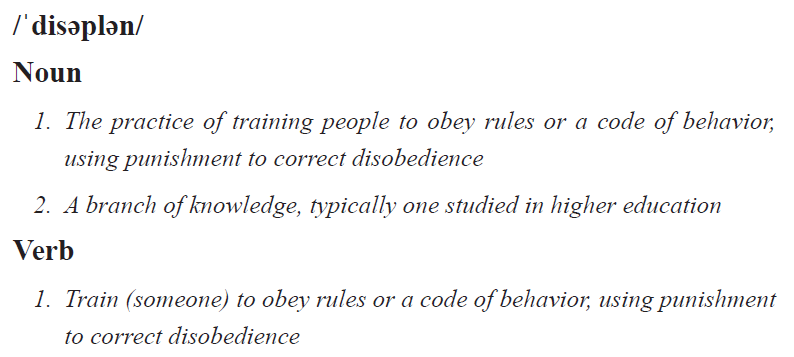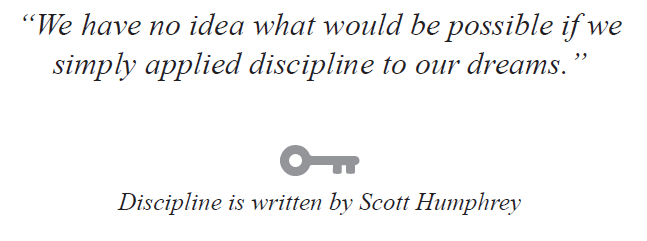Discipline



If you are like most people, when you saw the word discipline, you thought seriously about skipping this chapter. It just isn’t one of those words that excites the senses. It is, however, one of those words that, when embraced, separates the good from the great.
The truth is that discipline is required to achieve and maintain greatness. The problem for many of us is that we see discipline as drudgery. Your commitment to be your best encouraged you to read this book. And your
commitment to discipline in key areas of your life could change your destiny.
Think of a great athlete like swimmer Michael Phelps, the winningest Olympian of all time. He has won twenty-eight medals, including a record eight gold medals at the 2008 Olympic Games. Phelps didn’t wake up when he was fifteen and say, “I think I will qualify for the 2000 Olympics.” He began swimming when he was seven, at the encouragement of his mom to have an outlet for his energy. His parents were told he would never be able to focus on anything. His coach since age eleven acknowledges that Phelps spent a great deal of time on the side of the pool for bad behavior. He was later diagnosed with Attention Deficit Disorder.
But discipline changed his life. According to Greg Johnston, founder of The Mentor + Project, from age fourteen through the Beijing Olympics, Phelps trained seven days a week, 365 days a year. He figured that by training also on Sundays, he got a fifty-two-training-day advantage on his com- petition. He spent six hours in the water each day. He was able to channel all his energy into one discipline that developed into one habit: swimming daily. It is staggering to consider that he alone has won more medals than 161 countries combined.
But let’s face it—the thought of that level of commitment is overwhelming to most of us. We struggle to hold on to a New Year’s resolution for two weeks, much less 365 days a year.
What if discipline were not so overwhelming? What if we didn’t have to dread it or see it as something that takes a lifetime to acquire? What if a disciplined life were attainable within the confines of our daily routines?
Dr. Stan Beecham, a good friend of mine, is the author of Elite Minds— Creating the Competitive Advantage and Elite Minds—How Winners Think Differently (must-reads for those desiring to live their lives to the fullest). A few years ago, Stan sat down with me as I struggled to make a major career decision. As we talked through the pros and cons, he asked me why I was defending staying where I was when everything pointed toward my need to embrace the other opportunity. I offered many of the same reasons you likely have for staying as you are and not embracing all that life offers: not enough
ime, being comfortable where I was, people relying on me, etc. He listened, and then he shared the following story.
In the 1970s, there was a great deal of talk about television being detrimental to the development of children. One day, a discussion broke out about this topic in the weight room at the University of Georgia. Players were throwing out their ideas when their strength coach, Sam Mrvos, walked in. One of the players asked him how much TV he allowed his children to watch. He responded, “As much as they want.”
They were surprised and wondered aloud if he was joking. He just laughed and clarified that they could watch as much TV as they wanted—as long as they did push-ups during each commercial break. Not sure whether he was serious or not, the players dropped the subject. Several weeks later, one of Coach Mrvos’s boys was at the field house with him when one of the football players remembered the discussion. That player decided to challenge the young boy to a push-up competition. Several other players jumped in. Gradually, all the players dropped out and watched as the coach’s boy continued to do push-ups.
Here is the point: we often think of discipline as something that takes a lifetime of 24/7 focus to develop. Here was a young kid who didn’t do push-ups all day long; he simply did them during the commercials. Yet he outperformed some of the best-conditioned athletes of his day.
Last year, I challenged myself to prove what was possible through discipline. I started by doing a few push-ups during every TV commercial, with the goal of doing the equivalent of my age every day. I was fifty-four when I started and struggled to do ten push-ups at a time. But I continued and soon found fifty-four too easy. I decided to increase my daily goal to one hundred. Within a few weeks, I was no longer challenged by one hundred. I set a new goal of 50,000 for the year and ultimately increased that goal to 100,000. In 2017—through discipline—I did more than 110,000 push-ups, all during commercial breaks.
What about you? What are the things you would do if you applied discipline to your goals? What are the commercial breaks in your life that you can
use to make those goals a reality? The truth is, we have no idea what would be possible if we would simply apply discipline to our dreams!
The following are six important steps to achieving discipline in your life.
The first letters of the steps form the acronym PUSH-UP:
P – Pronounce your goal. Accountability is key to maintaining discipline, so tell others what you hope to achieve.
U – Understand your purpose. This is the why behind the disciplined effort.
S – Stay true to your goal. When you dare to be disciplined, you challenge the mediocrity in others.
H – Handle setbacks. Setbacks due to sickness or schedule can’t be avoid- ed. But don’t let a single miss derail you.
U – Update your progress. Consistent measurement is a vital part of discipline and encourages performance.
P – Persevere. Stay the course. Remember that discipline differentiates the good from the great.
